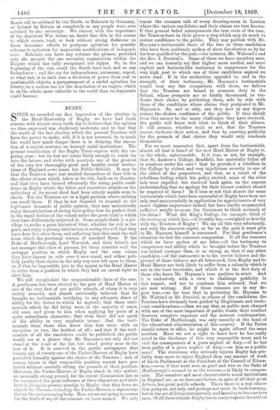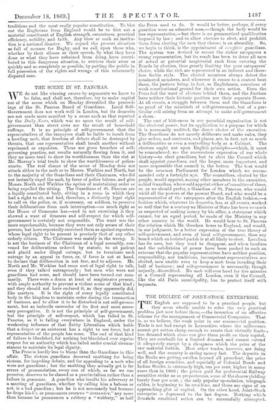RUGBY.
SINCE we recorded our first impression of the election to the Head-Mastership of Rugby, we have had fresh reasons with almost every fresh day to believe that the opinion we then expressed was studiously moderate, and to fear that the result of the last election which the present Trustees will have the power to make, will, if it is not reversed, be to teach the world how much danger there is in delaying the execu- tion of a capital sentence on decrepit social institutions. The present constitution of the Rugby Trust expires with the ex- piring year ; but its last act seems likely enough to reach far into the future, and strike with paralysis one of the greatest of the very few thoroughly great and healthy social institu- tions of England,—we mean her Public Schools. It may be that the Trustees have just availed themselves of that tide in the affairs of men which, taken at its ebb, leads on to disaster, and that they have turned effectually the rising public confi- dence in Rugby which the bitter and consistent attacks on the orthodoxy of its recent chief had been utterly unable even to check. Yet the Trustees are in a legal position where nothing can assail them. If they be not disposed to respond to the legitimate demands of public opinion, they may undoubtedly enjoy the satisfaction of seeing their policy bear its perfect fruit in the rapid decline of the school under the great trial to which they have deliberately subjected. it. Some people think it a pri- vilege to strike a great historical blow, whether for evil or for good, and enjoy a gloomy satisfaction in seeing the evil that they have done live after them, and reflecting that they sunk the well from which the perennial stream of mischief flows. If the Duke of Marlborough, Lord Warwick, and their friends are not amongst this class of persons, let them consider well the unhappy position in which Rugby and the man whom they have chosen to rule over it now stand, and either pub- licly justify their choice in the only way now left open to them, or, if that be impossible, join in the appeal to the Head Master to retire from a position to which they had no moral right to elect him.
We will recapitulate the unquestionable facts of the case. A gentleman has been elected to the post of Head Master of one of the very first of our public schools, of whom it is very widely asserted, and almost universally believed, that he brought no testimonials testifying to any adequate share of ability for the duties to which he aspired ; that those testi- monials which he did bring were, in the majority of cases, old ones, and given to him when applying for posts of a quite subordinate character ; that even these did not speak of his ability in very emphatic terms ; that the testi- monials from those who knew him best were, with an exception or two, the feeblest of all ; and that if the testi- monials of all the candidates could be published, the public would see at a glance that Mr. Hayman's not only did not stand at the head of the list, but stood pretty near to the foot of it. It is asserted in the public newspapers that twenty out of twenty-one of the Under-Masters of Rugby have protested formally against the choice of the Trustees ; and, of course, tutors in that responsible position cannot have pro- tested without carefully sifting the grounds of their position. Moreover, the Under-Masters of Rugby stand, in this matter, on unusually strong ground, for the recent Commission has so far recognized the great influence of their characters and intel- lects in giving its present prestige to Rugby, that they have as- signed the Masters, including the Under-Masters, a representa- tive on the neW managing body. Now, we are not going to answer for the truth of any of the rumours we have named. We only repeat the common talk of every drawing-room in London where the various candidates and their claims are best known. If that general belief misrepresents the true state of the case, the Trustees have in their power a step which may do much to restore confidence to the public. They may publish with Mr. Hayman's testimonials those of the two or three candidates who have been uniformly spoken of since the election as by far the best qualified for the post,—for instance, Mr. Walrond's and the Rev. J. Percival's. Some of these we have ourselves seen, and we can honestly say that higher, more cordial, and more explicit and business-like testimony to competence for the very high post to which one of these candidates aspired we never read. If in the authorities appealed to, and in the strength of their testimony, Mr. Hayman's testimonials would bear any fair comparison with these, we believe that the Trustees are bound in common duty to the School, whose prospects are so fatally threatened, to vin- dicate their choice by publishing them, aide by side with those of the candidates whose claims they postponed to Mr. Hayman's. So, and so only, can they now in any degree restore the shaken confidence of the public. If they shrink from this answer to the many challenges they have received, the public will know well what to think of their silence. It will assume, whether truly or not, that the Trustees cannot vindicate their action, and that by courting publicity for the grounds of that choice they would only condemn themselves.
For we must remember that, apart from the testimonials, almost all that is heard of the new Head Master of Rugby is, on the whole, unfavourable. Is it true, or not, for example, that St. Andrew's College, Bradfield, has materially fallen off in numbers under his care ? that he provoked a rebellion in the College by violent and very injudicious severity to one of the oldest of the prepositors, and that, as a result of the rebellious feeling which his policy excited, some of the elder lads were expelled, but received back again, on the express understanding that no apology for their former conduct should be required of them ? Is it true or not that almost the same testimonials which have been successful at Rugby have been not only used unsuccessfully in application for appointments of very much slighter importance indeed, but have hardly commanded sufficient weight to cause the Governors to think seriously of his claim ? What did King's College, for example, think of the testimony which has,—if it really has,—weighed so heavily with the Trustees of Rugby ? We say all this very reluctantly, and with the sincerest regret, so far as the pain it must give to Mr. Hayman himself is concerned. For that gentleman's situation we feel the sincerest compassion. If all the rumours which we have spoken of are false,—if the testimony to competence and ability which he brought before the Trustees was indeed stronger than, or as strong as, that of any other candidate,—if the statements as to his recent failures and the ground of those failures are all fabricated, then Rugby and its Head Master are both likely to suffer from a calamity which is not in the least inevitable, and which it is the first duty of those who know Mr. Hayman's true position to avert. And it is exclusively with a view to challenge publicity in this respect, and not to condemn him unheard, that we are now writing. But if these rumours are in any de- gree true,—so far true that in preferring Mr. Hayman to Mr. Walrond or Mr. Percival, or others of the candidates, the Trustees have obviously been guided by illegitimate and irrele- vant considerations,—then we say that, as public men charged with one of the most important of public trusts, their conduct deserves complete exposure and the severest condemnation. The Duke of Marlborough was only recently at the head of the educational administration of this country. If the Tories should return to office, he might be again offered the same position. Have we not a right to know how he has really acted in the discharge of this very responsible trust, and-to visit the consequences of a gross neglect of duty,—if he has been guilty of a gross neglect of duty,—on him as a public man ? The statesman who seriously injures Rugby has pro- bably done more to injure England than any amount of work of his in Parliament as the President of the Council of Educa- tion,—even if that work were as good and wise as the Duke of Marlborough's seemed to us the reverse,—is likely to compen- sate. The soundest and most characteristic social institutions in England are, as we have said before, in spite of all their great defects, her great public schools. There there is a real educa- tion going on, not only, and perhaps not most, in book-learning, but in the art of living courageously, and learning to become true men. Of all these schools, Rugby has in many respects the noblest
traditions and the most really popular constitution. To blot out the Rugbeians from England would be to blot out. a material constituent of English strength, earnestness, practical efficiency, nobility, and faith. Any blow at such an institu- tion is a national disaster. We regard the present situation as full of menace for Rugby, and we call. upon those who, whether by their silence or their speech, by what they have done or what they have refrained from doing, have contri- buted to this dangerous situation, to retrieve their error as quickly and as completely as possible, by putting the public in full possession of the rights and wrongs of this vehemently disputed case.







































 Previous page
Previous page